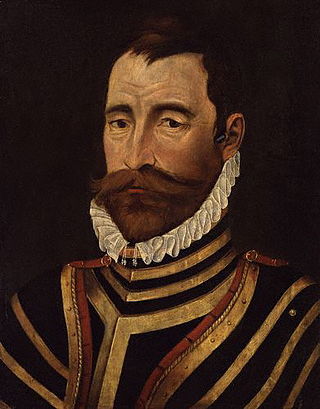
Sir Francis Walsingham was principal secretary to Queen Elizabeth I of England from 20 December 1573 until his death and is popularly remembered as her "spymaster".

Vespers is a liturgy of evening prayer, one of the canonical hours in Catholic, Eastern Orthodox, Oriental Orthodox, and Lutheran liturgies. The word for this prayer time comes from the Latin vesper, meaning "evening".
This article presents lists of the literary events and publications in 1600.

The Sicilian Vespers was a successful rebellion on the island of Sicily that broke out at Easter 1282 against the rule of the French-born king Charles I of Anjou, who had ruled the Kingdom of Sicily since 1266. The revolt came after twenty years of Angevin rule over Sicily, whose policies were deeply unpopular among the Sicilian populace.
The Lord Chamberlain's Men was a company of actors, or a "playing company", for which William Shakespeare wrote during most of his career. Richard Burbage played most of the lead roles, including Hamlet, Othello, King Lear, and Macbeth. Formed at the end of a period of flux in the theatrical world of London, it had become, by 1603, one of the two leading companies of the city and was subsequently patronized by James I.

St Andrew-by-the-Wardrobe is a Church of England church located on Queen Victoria Street, London in the City of London, near Blackfriars station.
Thomas Thirlby, was the first and only bishop of Westminster (1540–50), and afterwards successively bishop of Norwich (1550–54) and bishop of Ely (1554–59). While he acquiesced in the Henrician schism, with its rejection in principle of the Roman papacy, he remained otherwise loyal to the doctrine of the Roman Catholic Church during the English Reformation.

West Drayton is a suburban town in the London Borough of Hillingdon. It was an ancient parish in the county of Middlesex and from 1929 was part of the Yiewsley and West Drayton Urban District, which became part of Greater London in 1965. The settlement is near the Colne Valley Regional Park and its centre lies 1.9 miles (3 km) north of Heathrow Airport.

Oatlands Palace is a former Tudor and Stuart royal palace which took the place of the former manor of the village of Oatlands near Weybridge, Surrey. Little remains of the original building, so excavations of the palace took place in 1964 to rediscover its extent.

Sir William Drury was an English statesman and soldier.

Francis Cottington, 1st Baron Cottington was the English lord treasurer and ambassador and leader of the pro-Spanish, pro-Roman Catholic faction in the court of Charles I.
Thomas Drury was a British government informer, messenger and swindler, who is noted for having been one of the main people responsible for accusations of heresy, blasphemy, and seditious atheism on the part of the Elizabethan playwright Christopher Marlowe given to the Privy Council in May 1593. Within a couple of weeks, Marlowe, just 29 and the same age as William Shakespeare, but one of the single greatest influences upon his work, was dead.

The Globe was a Victorian theatre built in 1868 and demolished in 1902. It was the third of five London theatres to bear the name, following Shakespeare’s Bankside house, which closed in 1642, and the former Rotunda Theatre in Blackfriars Road, which for a few years from 1833 was renamed the Globe. The new theatre was also known at various times as the Royal Globe Theatre or Globe Theatre Royal. Its repertoire consisted mainly of comedies and musical shows.
Robert Drury (1587–1623) was an English Jesuit.
William Drury was an English dramatist.
William Drury, civilian, third son of John Drury of Rougham, Suffolk, by Elizabeth, daughter of John Goldingham of Belstead, Suffolk.

Ipswich Blackfriars was a medieval religious house of Friars-preachers (Dominicans) in the town of Ipswich, Suffolk, England, founded in 1263 by King Henry III and dissolved in 1538. It was the second of the three friaries established in the town, the first being the Greyfriars, a house of Franciscan Friars Minors, and the third the Ipswich Whitefriars of c. 1278–79. The Blackfriars were under the Visitation of Cambridge.

St John's Church is a Roman Catholic Church in Standishgate, Wigan, Greater Manchester. It is within 200 feet of another Catholic church, St Mary's. Construction on both churches, was done in a spirit of competition, so they both were finished in the same year, 1819. The competition was because St John's Church was originally served by the Society of Jesus, whereas St Mary's was always served by priests from the diocese. However, the Jesuits gave the church to the Archdiocese of Liverpool in 1933. It is a Grade II* listed building and the sanctuary inside the church was designed by Joseph John Scoles.
William Crashaw or Butt (1572–1626) was an English cleric, academic, and poet.
John Gee (c.1596–1639) was an English Church of England cleric. A survivor of the Fatal Vespers disaster, at a time when he was involved in clandestine Roman Catholic religious activity, he then became a writer against Catholics.











